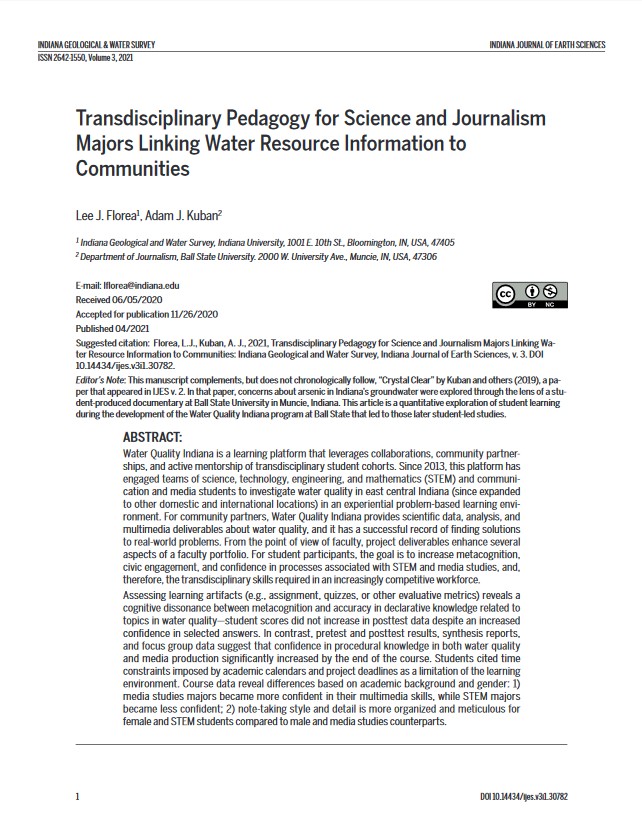Trans-Disciplinary Pedagogy for Science and Journalism Majors Linking Water Resource Information to Communities
Main Article Content
Abstract
Water Quality Indiana is a learning platform that leverages collaborations, community partnerships, and active mentorship of transdisciplinary student cohorts. Since 2013, this platform has engaged teams of science, technology, engineering, and mathematics (STEM) and communication and media students to investigate water quality in east central Indiana (since expanded to other domestic and international locations) in an experiential problem-based learning environment. For community partners, Water Quality Indiana provides scientific data, analysis, and multimedia deliverables about water quality, and it has a successful record of finding solutions to real-world problems. From the point of view of faculty, project deliverables enhance several aspects of a faculty portfolio. For student participants, the goal is to increase metacognition, civic engagement, and confidence in processes associated with STEM and media studies, and, therefore, the transdisciplinary skills required in an increasingly competitive workforce.
Assessing learning artifacts (e.g., assignment, quizzes, or other evaluative metrics) reveals a cognitive dissonance between metacognition and accuracy in declarative knowledge related to topics in water quality—student scores did not increase in posttest data despite an increased confidence in selected answers. In contrast, pretest and posttest results, synthesis reports, and focus group data suggest that confidence in procedural knowledge in both water quality and media production significantly increased by the end of the course. Students cited time constraints imposed by academic calendars and project deadlines as a limitation of the learning environment. Course data reveal differences based on academic background and gender: 1) media studies majors became more confident in their multimedia skills, while STEM majors became less confident; 2) note-taking style and detail is more organized and meticulous for female and STEM students compared to male and media studies counterparts.
Downloads
Article Details
All content for Indiana Journal of Earth Sciences is licensed under a Creative Commons Attribution-NonCommercial 4.0 International License (CC BY-NC 4.0; http://creativecommons.org/licenses/by-nc/4.0/), wherein the author retains copyright. As a service to the research community and as an outlet of its public mission, the IGWS commitment to true open access to scholarly information extends to authors, thus the Indiana Journal of Earth Sciences content is archived at the IGWS and the IU Open Scholar Works Archive.
